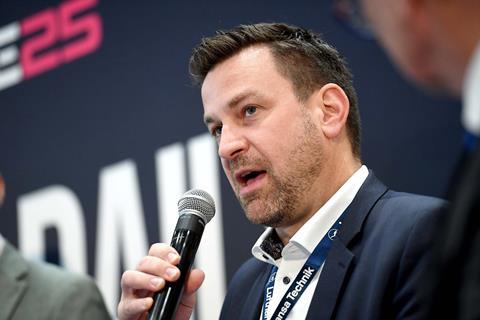Sales, VIP & Special Aircraft Services Fabian Nagel, Vice President of Lufthansa Technik, believes that new products have come into the business aviation market, benefiting from research investments that have emerged during the pandemic.
“VIP Aviation is often an incubator for innovation,” he said at the EBACE show in Geneva. “The good thing about VIP Aviation is that it allows you to develop a lot of the latest gadget technology. You can develop things in this market and then go to commercial customers later.”
Lufthansa Technik provides cabin management and entertainment systems to the VIP and business jet market along with cabin renovation and design services.
Nagel points to additional work that Lufthansa Technik could do with research investments to update its product range during the pandemic.

“We upgraded the entertainment connections in flight and developed new interfaces and touch displays within the cabin,” he says. Other innovations are approaching development.
“Some products take two years to develop and certified, and some of those products are now in the market,” he says.
One example includes Lufthansa Technik's Omni-Fi sound system. “It's a bit like the surround sound of a movie. It helps to reduce the noise in the cabin,” says Nagel.
The VIP business accounts for only about 5% of Lufthansa Technik's overall revenue, driven by a wide, strong demand for MRO services.
In addition to being a springboard for internal innovation, Nagel said, the VIP segment has been a strong performer both during and since the pandemic.
He also points out the broader strength of the Lufthansa Technique's performance across the Lufthansa Group, both financially and strategically.
The company recorded record operating profit of 635 million euros ($715 million) in 2024, as it passed revenue of 7 billion euros for the first time last year.
This strong performance continues this year, listing its highest quarter profit ever at 161 million euros for the three months ended March 31, 2025.
Last year, Lufthansa Technik said it plans to invest 1.2 billion euros ($1.3 billion) over the next four years to support its ambition 2030 strategic growth initiative after pro-Lufthansa abolished plans to sell partial interests of the company in November last year.
“We saw that airlines have internal MROs, which in fact helps keep their fleet flying,” says Nagel. “We've made a lot of investments. It's a new facility in Portugal and has started engine shops in WestJet and Calgary.”
Nagel says. The new 54,000-square-metre factory in Santa Maria da Feira near Porto has built its own facility in Portugal and is expected to be completed by the end of 2027.
In Canada, Lufthansa Technik has built a new engine maintenance facility in Calgary, serving CFM International Leap-1B Turbofans, and has signed a long-term maintenance agreement with local carrier Westjet.


